Corporate Law Case Study: Mortgage Validity and Company Law
VerifiedAdded on 2022/10/09
|6
|1307
|20
Case Study
AI Summary
This case study analyzes the enforceability of a mortgage in a corporate law context, focusing on the scenario where a bank provides a loan to a company owned by a husband and wife, both of whom are directors and one of whom is also the company secretary. The central issue revolves around whether the mortgage on a company asset is valid and enforceable, considering the relevant provisions of the Corporations Act 2001 (Cth). The analysis examines sections 127, 128, and 129 of the Act, which address the execution of documents, assumptions made by outsiders dealing with a company, and the doctrine of indoor management, referencing cases such as Royal British Bank v. Turquand, Mahoney v East Holyford Mining Co., and others to support the arguments. The application section assesses whether the bank can enforce the mortgage, considering the bank manager's knowledge of the situation and the execution of the loan documents. The conclusion affirms the bank's ability to enforce the mortgage, based on the principles discussed and the bank's role as an outsider assuming proper internal management.
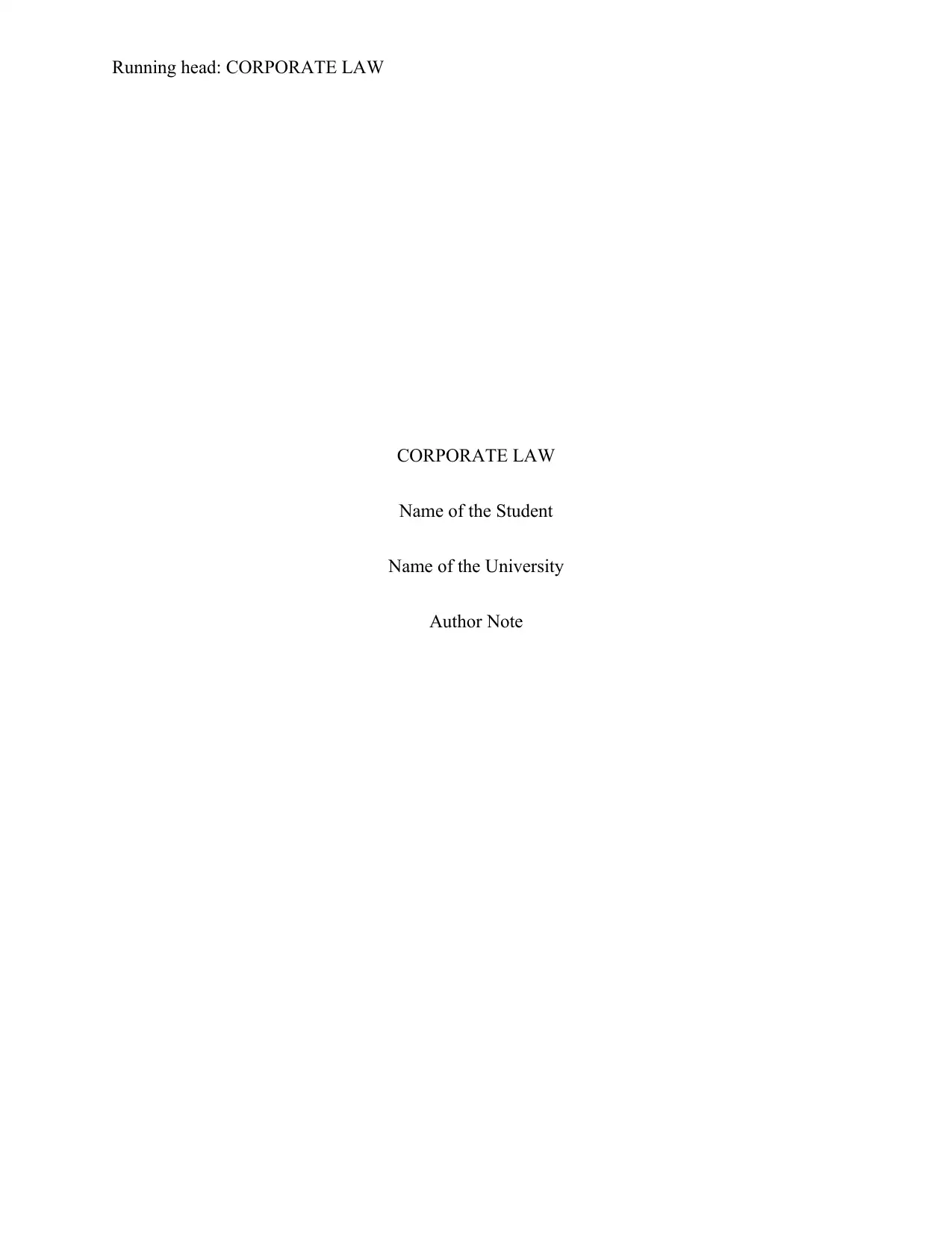
Running head: CORPORATE LAW
CORPORATE LAW
Name of the Student
Name of the University
Author Note
CORPORATE LAW
Name of the Student
Name of the University
Author Note
Paraphrase This Document
Need a fresh take? Get an instant paraphrase of this document with our AI Paraphraser
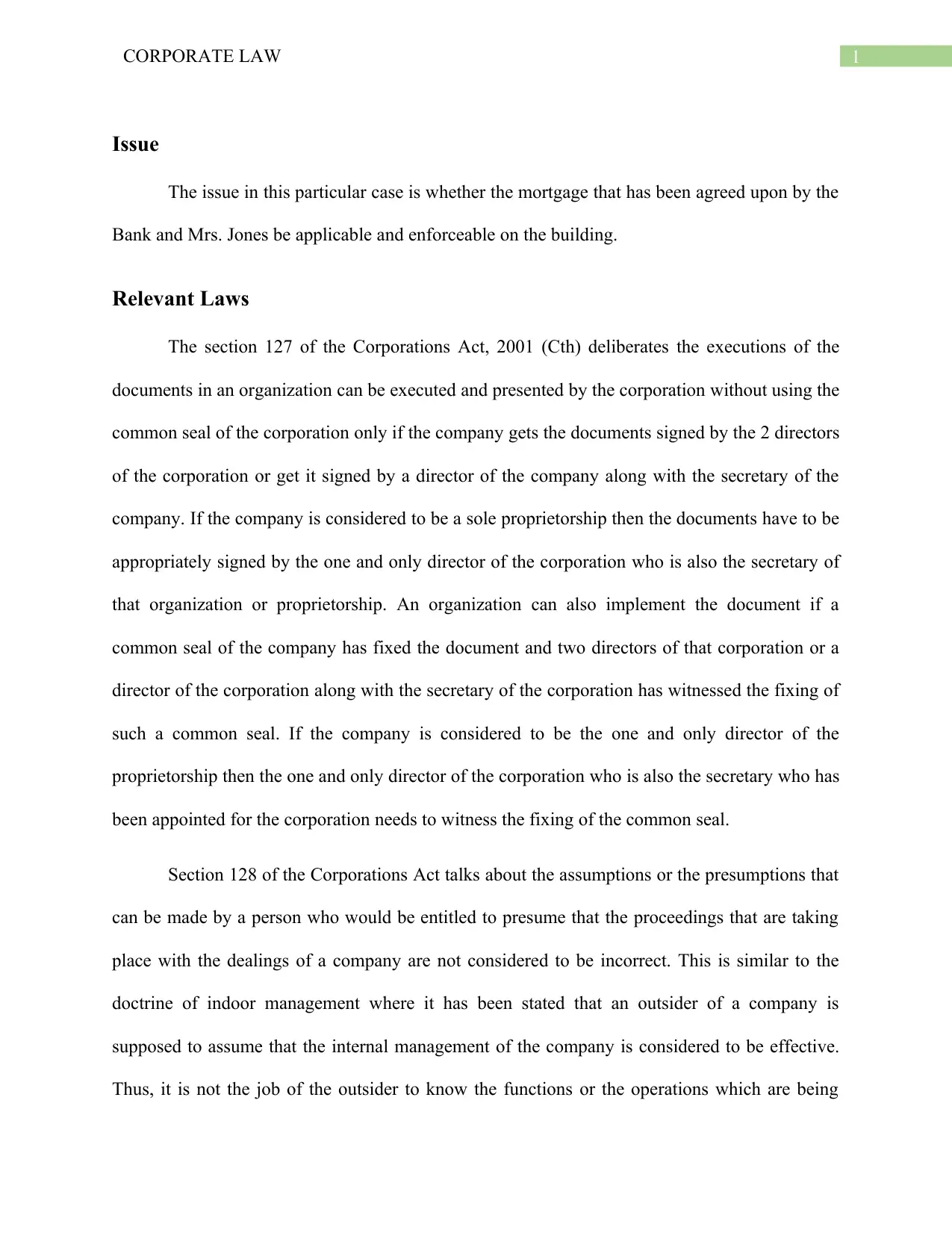
1CORPORATE LAW
Issue
The issue in this particular case is whether the mortgage that has been agreed upon by the
Bank and Mrs. Jones be applicable and enforceable on the building.
Relevant Laws
The section 127 of the Corporations Act, 2001 (Cth) deliberates the executions of the
documents in an organization can be executed and presented by the corporation without using the
common seal of the corporation only if the company gets the documents signed by the 2 directors
of the corporation or get it signed by a director of the company along with the secretary of the
company. If the company is considered to be a sole proprietorship then the documents have to be
appropriately signed by the one and only director of the corporation who is also the secretary of
that organization or proprietorship. An organization can also implement the document if a
common seal of the company has fixed the document and two directors of that corporation or a
director of the corporation along with the secretary of the corporation has witnessed the fixing of
such a common seal. If the company is considered to be the one and only director of the
proprietorship then the one and only director of the corporation who is also the secretary who has
been appointed for the corporation needs to witness the fixing of the common seal.
Section 128 of the Corporations Act talks about the assumptions or the presumptions that
can be made by a person who would be entitled to presume that the proceedings that are taking
place with the dealings of a company are not considered to be incorrect. This is similar to the
doctrine of indoor management where it has been stated that an outsider of a company is
supposed to assume that the internal management of the company is considered to be effective.
Thus, it is not the job of the outsider to know the functions or the operations which are being
Issue
The issue in this particular case is whether the mortgage that has been agreed upon by the
Bank and Mrs. Jones be applicable and enforceable on the building.
Relevant Laws
The section 127 of the Corporations Act, 2001 (Cth) deliberates the executions of the
documents in an organization can be executed and presented by the corporation without using the
common seal of the corporation only if the company gets the documents signed by the 2 directors
of the corporation or get it signed by a director of the company along with the secretary of the
company. If the company is considered to be a sole proprietorship then the documents have to be
appropriately signed by the one and only director of the corporation who is also the secretary of
that organization or proprietorship. An organization can also implement the document if a
common seal of the company has fixed the document and two directors of that corporation or a
director of the corporation along with the secretary of the corporation has witnessed the fixing of
such a common seal. If the company is considered to be the one and only director of the
proprietorship then the one and only director of the corporation who is also the secretary who has
been appointed for the corporation needs to witness the fixing of the common seal.
Section 128 of the Corporations Act talks about the assumptions or the presumptions that
can be made by a person who would be entitled to presume that the proceedings that are taking
place with the dealings of a company are not considered to be incorrect. This is similar to the
doctrine of indoor management where it has been stated that an outsider of a company is
supposed to assume that the internal management of the company is considered to be effective.
Thus, it is not the job of the outsider to know the functions or the operations which are being
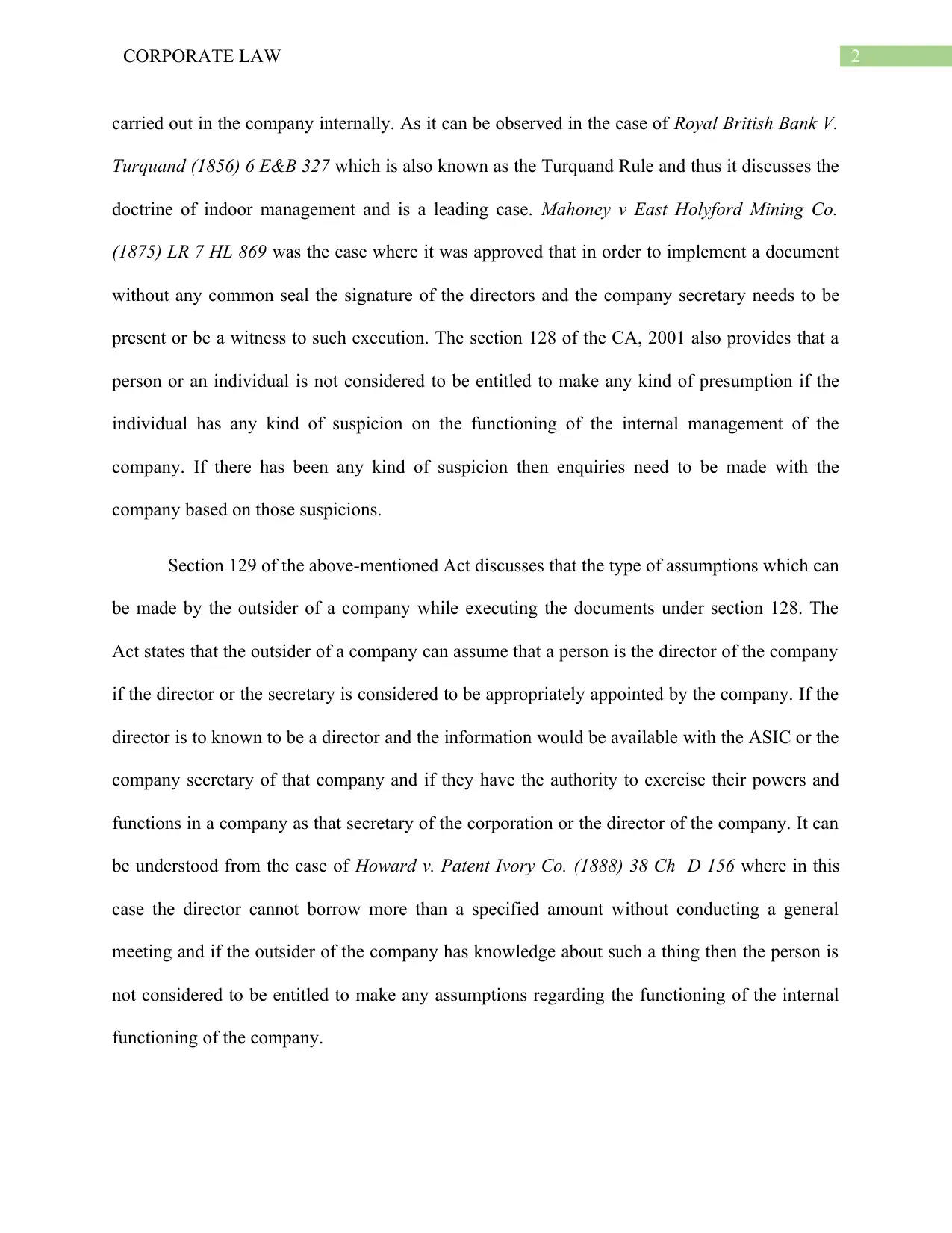
2CORPORATE LAW
carried out in the company internally. As it can be observed in the case of Royal British Bank V.
Turquand (1856) 6 E&B 327 which is also known as the Turquand Rule and thus it discusses the
doctrine of indoor management and is a leading case. Mahoney v East Holyford Mining Co.
(1875) LR 7 HL 869 was the case where it was approved that in order to implement a document
without any common seal the signature of the directors and the company secretary needs to be
present or be a witness to such execution. The section 128 of the CA, 2001 also provides that a
person or an individual is not considered to be entitled to make any kind of presumption if the
individual has any kind of suspicion on the functioning of the internal management of the
company. If there has been any kind of suspicion then enquiries need to be made with the
company based on those suspicions.
Section 129 of the above-mentioned Act discusses that the type of assumptions which can
be made by the outsider of a company while executing the documents under section 128. The
Act states that the outsider of a company can assume that a person is the director of the company
if the director or the secretary is considered to be appropriately appointed by the company. If the
director is to known to be a director and the information would be available with the ASIC or the
company secretary of that company and if they have the authority to exercise their powers and
functions in a company as that secretary of the corporation or the director of the company. It can
be understood from the case of Howard v. Patent Ivory Co. (1888) 38 Ch D 156 where in this
case the director cannot borrow more than a specified amount without conducting a general
meeting and if the outsider of the company has knowledge about such a thing then the person is
not considered to be entitled to make any assumptions regarding the functioning of the internal
functioning of the company.
carried out in the company internally. As it can be observed in the case of Royal British Bank V.
Turquand (1856) 6 E&B 327 which is also known as the Turquand Rule and thus it discusses the
doctrine of indoor management and is a leading case. Mahoney v East Holyford Mining Co.
(1875) LR 7 HL 869 was the case where it was approved that in order to implement a document
without any common seal the signature of the directors and the company secretary needs to be
present or be a witness to such execution. The section 128 of the CA, 2001 also provides that a
person or an individual is not considered to be entitled to make any kind of presumption if the
individual has any kind of suspicion on the functioning of the internal management of the
company. If there has been any kind of suspicion then enquiries need to be made with the
company based on those suspicions.
Section 129 of the above-mentioned Act discusses that the type of assumptions which can
be made by the outsider of a company while executing the documents under section 128. The
Act states that the outsider of a company can assume that a person is the director of the company
if the director or the secretary is considered to be appropriately appointed by the company. If the
director is to known to be a director and the information would be available with the ASIC or the
company secretary of that company and if they have the authority to exercise their powers and
functions in a company as that secretary of the corporation or the director of the company. It can
be understood from the case of Howard v. Patent Ivory Co. (1888) 38 Ch D 156 where in this
case the director cannot borrow more than a specified amount without conducting a general
meeting and if the outsider of the company has knowledge about such a thing then the person is
not considered to be entitled to make any assumptions regarding the functioning of the internal
functioning of the company.
⊘ This is a preview!⊘
Do you want full access?
Subscribe today to unlock all pages.

Trusted by 1+ million students worldwide
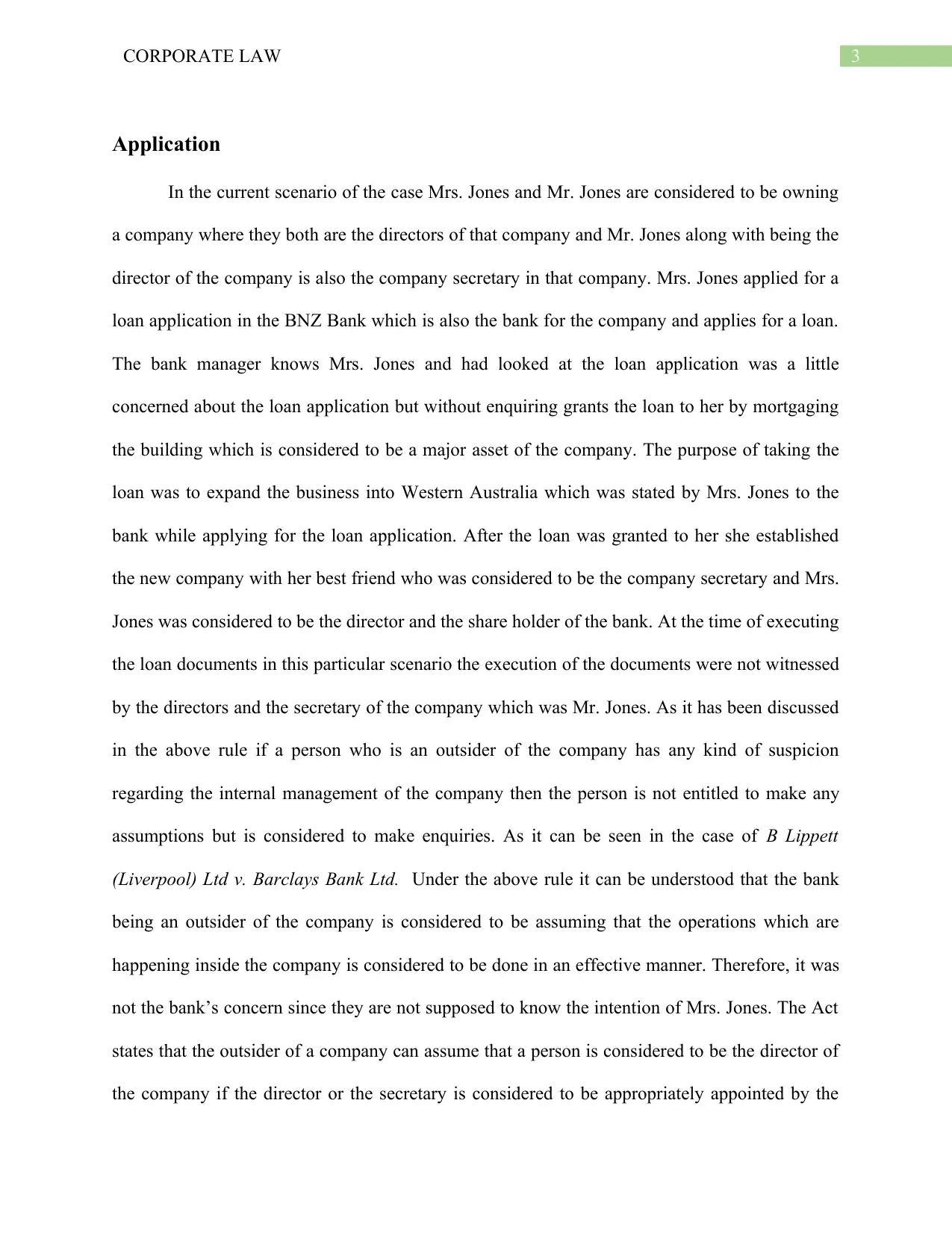
3CORPORATE LAW
Application
In the current scenario of the case Mrs. Jones and Mr. Jones are considered to be owning
a company where they both are the directors of that company and Mr. Jones along with being the
director of the company is also the company secretary in that company. Mrs. Jones applied for a
loan application in the BNZ Bank which is also the bank for the company and applies for a loan.
The bank manager knows Mrs. Jones and had looked at the loan application was a little
concerned about the loan application but without enquiring grants the loan to her by mortgaging
the building which is considered to be a major asset of the company. The purpose of taking the
loan was to expand the business into Western Australia which was stated by Mrs. Jones to the
bank while applying for the loan application. After the loan was granted to her she established
the new company with her best friend who was considered to be the company secretary and Mrs.
Jones was considered to be the director and the share holder of the bank. At the time of executing
the loan documents in this particular scenario the execution of the documents were not witnessed
by the directors and the secretary of the company which was Mr. Jones. As it has been discussed
in the above rule if a person who is an outsider of the company has any kind of suspicion
regarding the internal management of the company then the person is not entitled to make any
assumptions but is considered to make enquiries. As it can be seen in the case of B Lippett
(Liverpool) Ltd v. Barclays Bank Ltd. Under the above rule it can be understood that the bank
being an outsider of the company is considered to be assuming that the operations which are
happening inside the company is considered to be done in an effective manner. Therefore, it was
not the bank’s concern since they are not supposed to know the intention of Mrs. Jones. The Act
states that the outsider of a company can assume that a person is considered to be the director of
the company if the director or the secretary is considered to be appropriately appointed by the
Application
In the current scenario of the case Mrs. Jones and Mr. Jones are considered to be owning
a company where they both are the directors of that company and Mr. Jones along with being the
director of the company is also the company secretary in that company. Mrs. Jones applied for a
loan application in the BNZ Bank which is also the bank for the company and applies for a loan.
The bank manager knows Mrs. Jones and had looked at the loan application was a little
concerned about the loan application but without enquiring grants the loan to her by mortgaging
the building which is considered to be a major asset of the company. The purpose of taking the
loan was to expand the business into Western Australia which was stated by Mrs. Jones to the
bank while applying for the loan application. After the loan was granted to her she established
the new company with her best friend who was considered to be the company secretary and Mrs.
Jones was considered to be the director and the share holder of the bank. At the time of executing
the loan documents in this particular scenario the execution of the documents were not witnessed
by the directors and the secretary of the company which was Mr. Jones. As it has been discussed
in the above rule if a person who is an outsider of the company has any kind of suspicion
regarding the internal management of the company then the person is not entitled to make any
assumptions but is considered to make enquiries. As it can be seen in the case of B Lippett
(Liverpool) Ltd v. Barclays Bank Ltd. Under the above rule it can be understood that the bank
being an outsider of the company is considered to be assuming that the operations which are
happening inside the company is considered to be done in an effective manner. Therefore, it was
not the bank’s concern since they are not supposed to know the intention of Mrs. Jones. The Act
states that the outsider of a company can assume that a person is considered to be the director of
the company if the director or the secretary is considered to be appropriately appointed by the
Paraphrase This Document
Need a fresh take? Get an instant paraphrase of this document with our AI Paraphraser
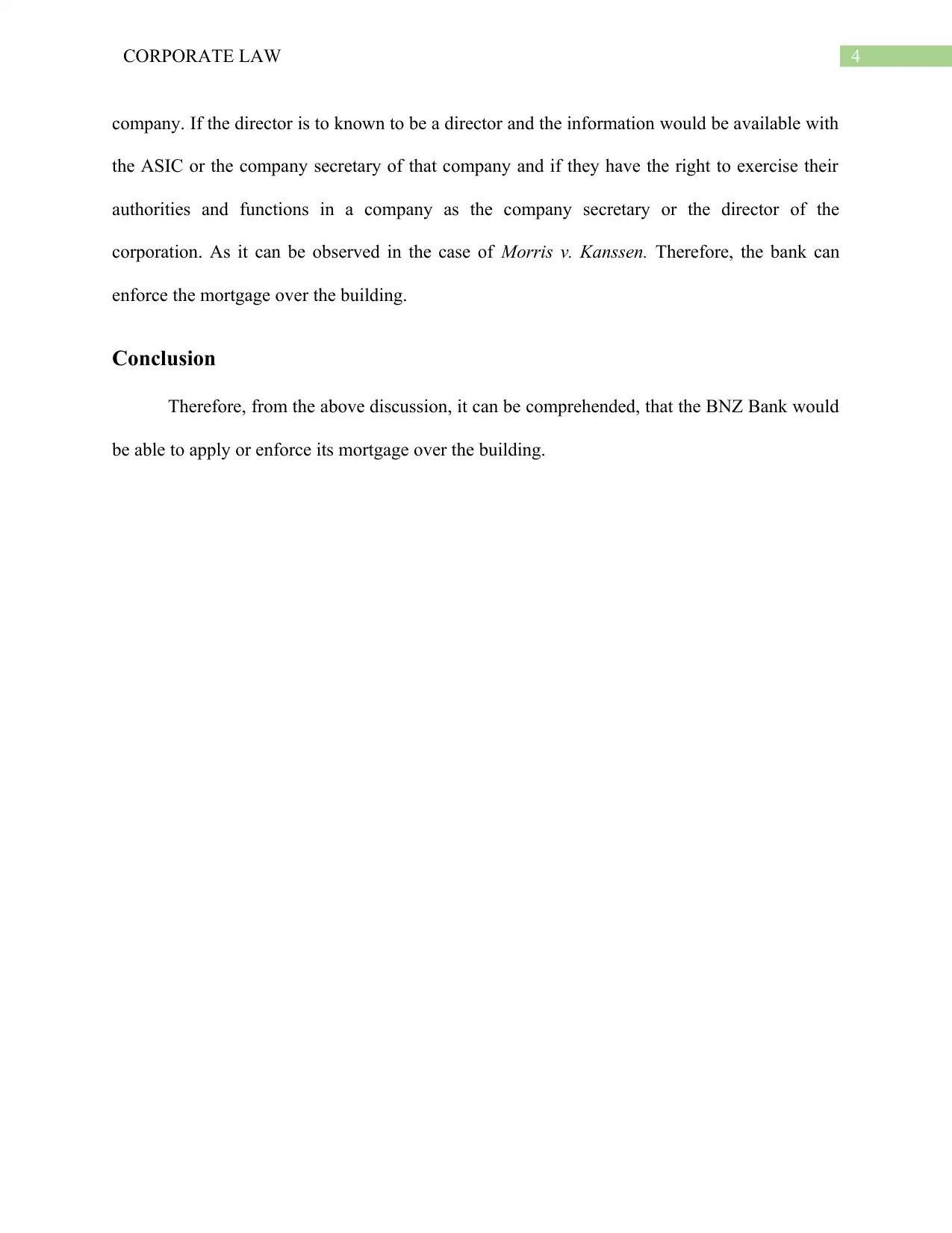
4CORPORATE LAW
company. If the director is to known to be a director and the information would be available with
the ASIC or the company secretary of that company and if they have the right to exercise their
authorities and functions in a company as the company secretary or the director of the
corporation. As it can be observed in the case of Morris v. Kanssen. Therefore, the bank can
enforce the mortgage over the building.
Conclusion
Therefore, from the above discussion, it can be comprehended, that the BNZ Bank would
be able to apply or enforce its mortgage over the building.
company. If the director is to known to be a director and the information would be available with
the ASIC or the company secretary of that company and if they have the right to exercise their
authorities and functions in a company as the company secretary or the director of the
corporation. As it can be observed in the case of Morris v. Kanssen. Therefore, the bank can
enforce the mortgage over the building.
Conclusion
Therefore, from the above discussion, it can be comprehended, that the BNZ Bank would
be able to apply or enforce its mortgage over the building.
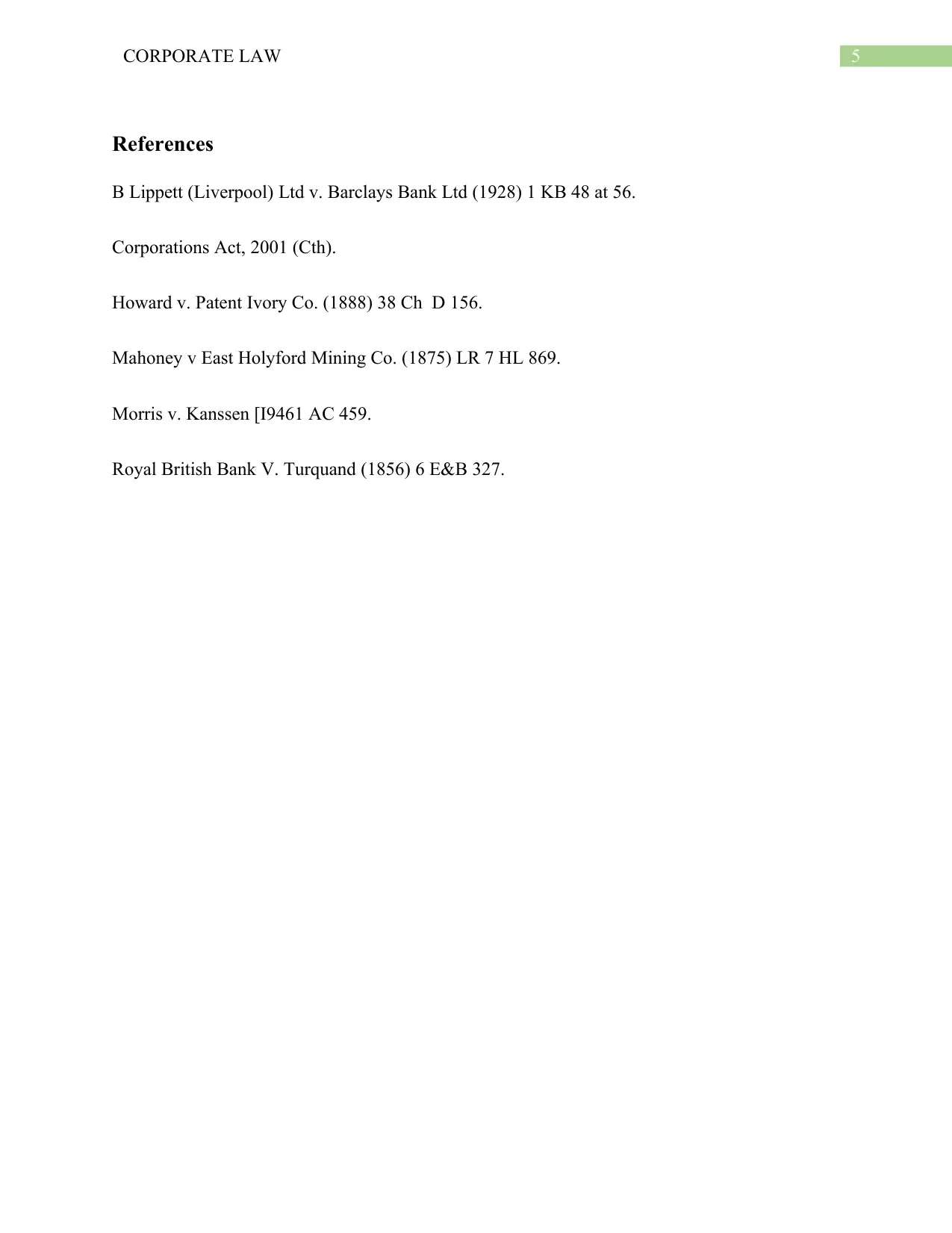
5CORPORATE LAW
References
B Lippett (Liverpool) Ltd v. Barclays Bank Ltd (1928) 1 KB 48 at 56.
Corporations Act, 2001 (Cth).
Howard v. Patent Ivory Co. (1888) 38 Ch D 156.
Mahoney v East Holyford Mining Co. (1875) LR 7 HL 869.
Morris v. Kanssen [I9461 AC 459.
Royal British Bank V. Turquand (1856) 6 E&B 327.
References
B Lippett (Liverpool) Ltd v. Barclays Bank Ltd (1928) 1 KB 48 at 56.
Corporations Act, 2001 (Cth).
Howard v. Patent Ivory Co. (1888) 38 Ch D 156.
Mahoney v East Holyford Mining Co. (1875) LR 7 HL 869.
Morris v. Kanssen [I9461 AC 459.
Royal British Bank V. Turquand (1856) 6 E&B 327.
⊘ This is a preview!⊘
Do you want full access?
Subscribe today to unlock all pages.

Trusted by 1+ million students worldwide
1 out of 6
Related Documents
Your All-in-One AI-Powered Toolkit for Academic Success.
+13062052269
info@desklib.com
Available 24*7 on WhatsApp / Email
![[object Object]](/_next/static/media/star-bottom.7253800d.svg)
Unlock your academic potential
Copyright © 2020–2026 A2Z Services. All Rights Reserved. Developed and managed by ZUCOL.



